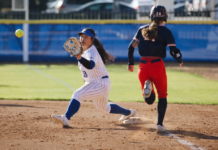On Friday, March 13, the Big West Conference moved from indefinitely suspending to cancelling all spring conference and non-conference competition and championship events for the 2020 season. This announcement came the day after the NCAA announced they were cancelling all 2020 spring championships. These announcements effectively ended collegiate sports for the remainder of the year in an effort to protect the health of athletes and officials in the wake of a global health pandemic.
The shutdown had profound effects on athletes participating in multiple sports, including men’s and women’s basketball, track and field, baseball, softball, golf and tennis. For example, the shutdown was announced the day before NCAA Track & Field Indoor Nationals and the men’s and women’s basketball conference tournaments. Track athletes were already arriving in Albuquerque when the NCAA shutdown was announced.
For some senior student-athletes, these championship events were a unique opportunity to earn All-American titles, an opportunity that they’ll never get back. For others, seasons were cancelled before they even started. According to an official release from the NCAA, they are working on a form of eligibility relief to grant seniors an extra year of competition, to “be finalized later with input from the Division I membership.” However, this introduces a complex combination of possible issues for student-athletes and universities.
For seniors, an extra year of eligibility possibly presents the task of assessing prior post graduate plans. Those not planning to attend graduate school may consider it now, in the effort to see their final season of competition through. Unfortunately, some athletes may not be able to afford graduate school and it might be difficult to secure a scholarship in a time where programs everywhere are experiencing unprecedented roster changes.
In an interview with The Highlander, Director of Cross Country/Track and Field, Nate Browne, called the day of the NCAA shutdown the toughest of his career. “There were so many changes literally by the hour it seemed like a snowball rolling down hill. The hardest part was seeing the disappointment on the faces of each athlete and having them ask questions we didn’t know the answer to. What would happen to kids that didn’t have another year? Those that weren’t planning for grad school? How they would navigate adjusting to not having the student-athlete balance in their life,” he said.
Browne added, “it’ll be interesting to see how the NCAA adjusts legislation or creates waiver opportunities to insure kids that want it get their last season of competition. Certainly there is a financial component as there is an incoming freshman class around the country and now with the shutdown some spots that won’t necessarily be vacated. We’ve heard that the decisions will start to come March 30 and we wait with anticipation. As with anything in life – we will get through this. We’ll learn from it.”
In an open letter to UC Riverside student-athletes, coaches and staff, Athletic Director Tamica Smith Jones wrote, “This is a good time to remind ourselves of how sport prepares us for life and how to respond to adversity. All of the lessons we learn through sport provide us with the transferrable skills we need to maneuver through situations like the one we are facing now.”
For athletes participating in sports affected by the shutdown, an extra year means more time to train, more time to rehabilitate injuries and more time to aspire for more.
Editor’s note: Callie Lawson-Freeman, the writer of this article, is a fourth-year student-athlete on the track and field team.






